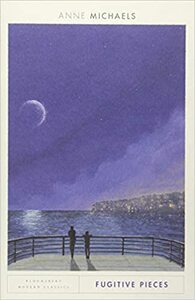Take a photo of a barcode or cover
reflective
sad
medium-paced
Plot or Character Driven:
A mix
Strong character development:
Yes
Loveable characters:
Yes
Diverse cast of characters:
Yes
Flaws of characters a main focus:
Complicated
dark
reflective
sad
slow-paced
I found this piece of literature to be fairly boring, to be honest. I was looking forward to an interesting piece of literature about life after surviving the Holocaust, but it was uneventful and the first 60 pages just described the Greek man's life, who saved him, without delving into his own issues. Disappointing.
This is the story of Jakob Beer, a seven year old Jewish boy in the Polish town of Biskupin, the site of an ancient Iron Age fort. The Nazis have invaded Poland and Jakob’s parents have been killed, his precious sister, Bella, has disappeared and Jakob has survived only by hiding behind a wall. He is smuggled out of Poland by a Greek archaeologist/geologist named Athos, who had been working on the site. Athos takes young Jakob to the Greek island of Zakynthos, where he remains hidden throughout the war.
Athos is a learned man and teaches Jakob in a mix of Greek and English. Athos’s library contains volumes of Linnaeus, Darwin and Mendeleev alongside Dante, Aeschylus and Solomos. After the war the pair emigrate to Toronto, where Jakob eventually becomes a poet. The story begins with him attempting to write his memoirs, not for our benefit but for his own. The fugitive pieces are fragments of his own memories pieced together with what he later learnt.
Over halfway through the book, the narration is taken up by Ben, whose parents survived the Holocaust but are deeply traumatised. When their house in Toronto is threatened with flooding and the neighbours bang on their door, they don’t answer. Ben is their third child but just named “Ben”, the Hebrew for “son”, not even Benjamin, fearing he maybe lost like his elder siblings. Ben is an academic who admires the poet Jakob and becomes obsessed with his story.
The writing is often stunning. There are so many beautiful and deeply profound passages of prose in this novel. Sometimes these passages appear like isolated magical islands, somehow adrift from the main narrative.
Athos is a learned man and teaches Jakob in a mix of Greek and English. Athos’s library contains volumes of Linnaeus, Darwin and Mendeleev alongside Dante, Aeschylus and Solomos. After the war the pair emigrate to Toronto, where Jakob eventually becomes a poet. The story begins with him attempting to write his memoirs, not for our benefit but for his own. The fugitive pieces are fragments of his own memories pieced together with what he later learnt.
There are two rules for walking in Greece that Athos taught me as we climbed a hill and left Kyllini behind. Never follow a goat, you’ll end up at the edge of a cliff. Always follow a mule, you’ll arrive at a village by nightfall.
Over halfway through the book, the narration is taken up by Ben, whose parents survived the Holocaust but are deeply traumatised. When their house in Toronto is threatened with flooding and the neighbours bang on their door, they don’t answer. Ben is their third child but just named “Ben”, the Hebrew for “son”, not even Benjamin, fearing he maybe lost like his elder siblings. Ben is an academic who admires the poet Jakob and becomes obsessed with his story.
The writing is often stunning. There are so many beautiful and deeply profound passages of prose in this novel. Sometimes these passages appear like isolated magical islands, somehow adrift from the main narrative.
emotional
hopeful
reflective
slow-paced
Plot or Character Driven:
Character
Strong character development:
Yes
Loveable characters:
Yes
Diverse cast of characters:
Yes
Flaws of characters a main focus:
Yes
emotional
reflective
sad
slow-paced
Plot or Character Driven:
Character
Strong character development:
Yes
challenging
dark
emotional
hopeful
informative
reflective
sad
slow-paced
Plot or Character Driven:
Character
Strong character development:
Yes
Loveable characters:
Yes
Diverse cast of characters:
N/A
Flaws of characters a main focus:
Yes
dark
emotional
reflective
sad
medium-paced
challenging
dark
emotional
hopeful
inspiring
mysterious
reflective
sad
medium-paced
Plot or Character Driven:
A mix
Strong character development:
Yes
Loveable characters:
Yes
Diverse cast of characters:
Yes
Flaws of characters a main focus:
Complicated



